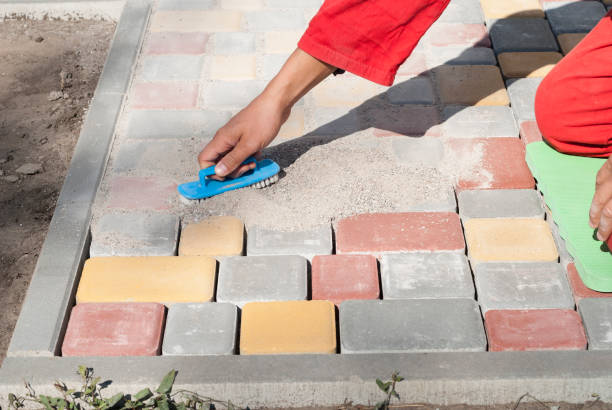
In Tempe, AZ, brick, concrete, and travertine pavers bring beauty, structure, and value to your home’s outdoor spaces. But under Arizona’s punishing sun and occasional monsoon rains, even the best-installed pavers need routine resealing to stay protected.
Knowing when to reseal your pavers can make the difference between a simple maintenance project and a costly restoration down the line. Fortunately, spotting the signs early is easier than you might think.
Key Takeaways
- Most pavers in Arizona climates need resealing every 2–4 years.
- Fading, staining, and water absorption are key signs it’s time to reseal.
- Timely resealing preserves color, stability, and surface protection.
Why Resealing Matters in Tempe’s Climate
Tempe’s year-round sunshine, coupled with dust storms and sudden downpours, is tough on outdoor surfaces. Without a fresh, breathable sealant:
- UV rays fade and weaken your pavers
- Moisture seeps into joints and base layers
- Oil stains and grime become harder to clean
- Joint sand erodes, leading to shifting or weeds
If it’s been a few years since your last sealing—or you’re not sure if your pavers have ever been sealed—now is the time to schedule an inspection with Paver Sealing Arizona.
5 Signs It’s Time to Reseal Your Pavers
- Fading Color
Sealers enhance the natural richness of paver materials. When colors look dull or washed out, it’s a clear sign the protective layer has worn away. - Water No Longer Beads
Water should bead on a properly sealed surface. If water soaks in instead, it means your sealer has broken down and needs renewal. - Increase in Dirt, Dust, and Staining
If stains or dirt are becoming harder to remove, your pavers are absorbing contaminants instead of repelling them. - Joint Sand Loss
Sealing helps lock joint sand in place. If sand has eroded between your pavers, resealing combined with re-sanding is necessary. - Surface Wear or Pitting
Physical signs of erosion, chipping, or surface roughness mean your pavers are exposed to the elements without adequate protection.
For tips on keeping pavers beautiful post-sealing, check out our guide on Maintaining Sealed Pavers for Long-Lasting Results.
How Often Should You Reseal Pavers in Tempe?
- High-traffic driveways and patios: Every 2–3 years
- Light-use areas like garden paths: Every 3–4 years
- Pool decks exposed to chlorine and water: Every 2 years
Bob Vila recommends resealing based on traffic patterns and weather conditions—and Arizona’s climate demands more frequent maintenance than cooler, wetter regions.
Professional vs. DIY Resealing: What’s Best?
While DIY kits are available, professional resealing provides:
- Deeper surface prep (stain removal, mold treatment, sanding)
- Uniform application with commercial-grade sealers
- Longer-lasting results with proper curing and coverage
Plus, experts know how to handle climate-specific challenges like rapid evaporation and dust contamination during the curing process.
Want to see real results? We proudly serve nearby communities like Paradise Valley, AZ, helping homeowners protect and beautify their pavers against harsh conditions.
What Happens If You Don’t Reseal Your Pavers?
Delaying resealing can lead to:
- Faded, unattractive surfaces
- Weed growth in joints
- Pavers loosening, cracking, or sinking
- Expensive full-scale restorations later
The Spruce warns that neglecting paver sealing often results in irreversible damage, particularly in sun-drenched environments like Tempe.
Ready to Protect Your Outdoor Surfaces?
Don’t wait for visible damage before taking action. At Paver Sealing Arizona, we offer:
- Thorough inspections
- Power cleaning and polymeric re-sanding
- Commercial-grade breathable sealing
- Tailored service plans for your specific paver material and use case
Schedule your consultation today by visiting Paver Sealing Arizona. Let’s help your pavers stay beautiful, strong, and protected—season after season.

